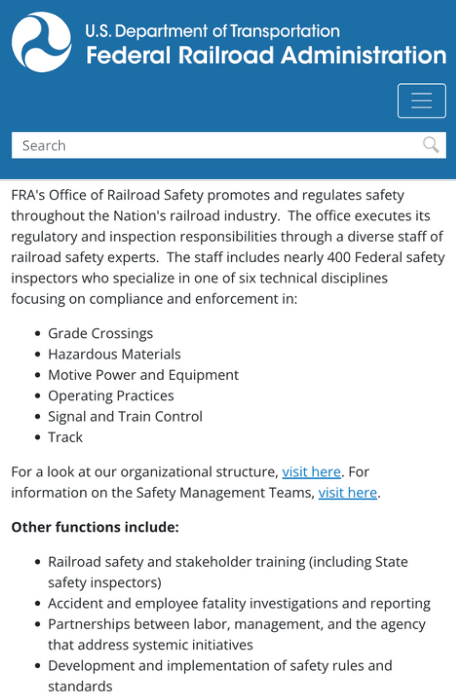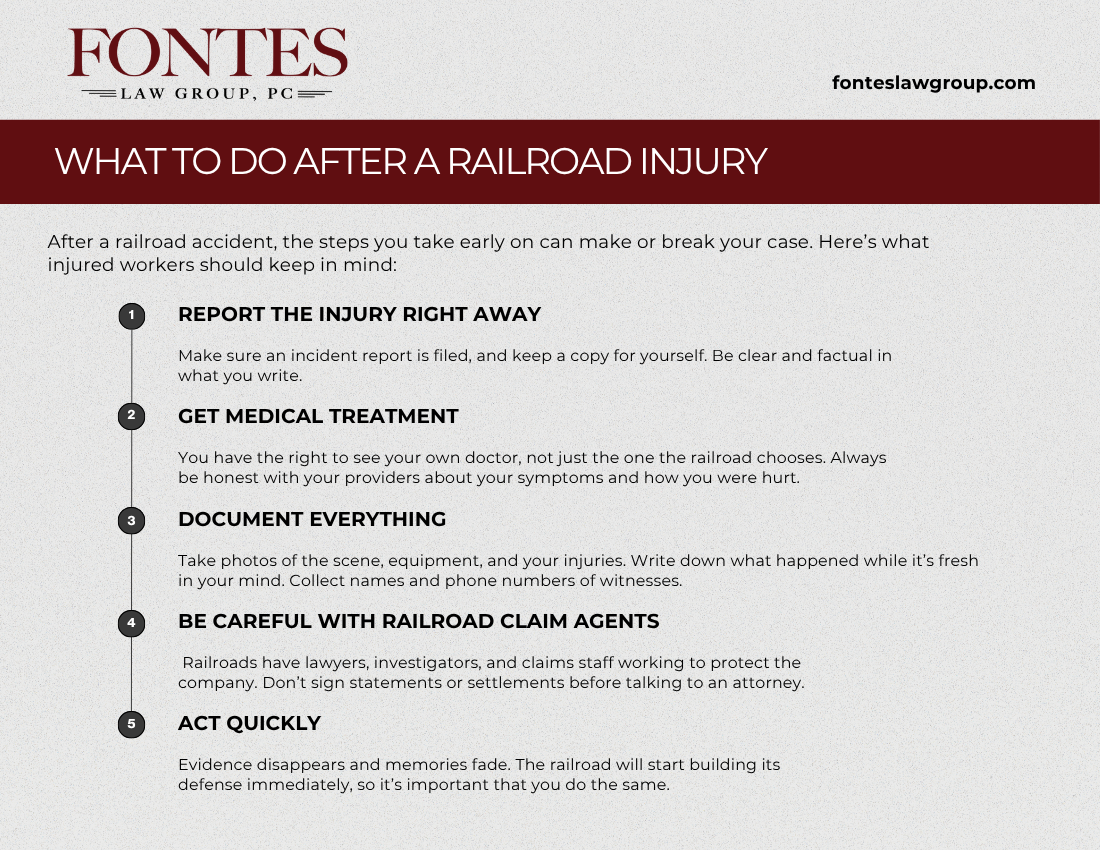The Federal Employers’ Liability Act (FELA) Protects Injured Railroad Workers
For most employees, workers’ compensation is the system that covers job-related injuries. But railroad workers are different. They’re covered under a special law called the Federal Employers’ Liability Act, or FELA. And that difference matters.
Railroad jobs are some of the toughest in the country. They involve heavy equipment, long hours, and dangerous conditions that can change a worker’s life in an instant. When accidents happen, families are often left worrying about medical bills, missed paychecks, and whether the company will step up to do the right thing.
FELA exists to make sure railroad workers aren’t left on their own after an injury.
This guide breaks down how the law works, who it protects, and why it can make all the difference if you or someone you love is hurt while working for the railroad.
What is FELA?
The Federal Employers’ Liability Act was passed in 1908 to protect railroad workers injured on the job. Unlike regular workers’ comp, which usually pays benefits no matter who was at fault, FELA requires proof that the railroad was at least partly negligent.
But the law gives injured workers a fairer chance than it may sound. You don’t have to show the railroad was completely responsible. It’s enough to prove their negligence played some role in your injury, even if only a small part.
And if the railroad violated a federal safety law or regulation, the rules are even stricter: liability can be automatic without you having to prove negligence.
It’s also important to know that railroad employees are not covered by state workers’ compensation laws.
FELA was designed as their exclusive remedy, making it the only legal path for recovery after a job-related injury in the rail industry.
Who Are Railroad Workers?
When most people think of railroad jobs, they picture train crews, engineers and conductors guiding massive locomotives down the tracks. But FELA protections reach far beyond that.
This law covers almost anyone whose work supports railroad operations, whether on the front lines or behind the scenes. That includes:
- Train crews: Engineers, conductors, brakemen, and switch operators.
- Track and yard workers: Teams who repair rails, switches, and keep yards safe.
- Mechanical staff: Machinists, electricians, and carmen who repair locomotives and freight cars.
- Signal and communication workers: Specialists maintaining the safety systems that guide trains.
- Clerical and station staff: Dispatchers, ticket agents, and other support roles.
FELA even extends to situations you might not expect.
For example:
If a worker slips on ice in a railroad parking lot, or is injured in lodging arranged by the railroad, they may still be protected. The law recognizes that “railroad work” doesn’t stop at the train itself, it includes all the spaces and duties tied to the job.
Why Railroad Workers Don’t Use Workers’ Compensation

Most employees in California rely on workers’ compensation for medical bills and partial wage replacement. But railroad employees are excluded from state workers’ comp laws. Instead, FELA is their remedy.
The key differences are important:
- Fault matters: In workers’ comp, fault doesn’t matter. Under FELA, you must show the railroad’s negligence played a role in your injury.
- Jury trials: FELA cases can go before a jury, unlike workers’ comp claims that are handled through administrative processes.
- Broader damages: Workers’ comp only pays medical bills and part of lost wages. FELA can cover pain and suffering, future lost earnings, and more.
According to the U.S. Department of Transportation, railroad safety continues to be a concern nationwide. That’s why FELA remains such an important law for those who keep America’s trains moving.
Common Railroad Injuries Covered by FELA
Working on or around trains involves heavy equipment, moving vehicles, and constant risk. Some of the most common injuries seen in FELA cases include:
- Broken bones from falls or collisions
- Back and neck injuries from lifting heavy loads
- Burns or electrocution from faulty wiring or chemical exposure
- Repetitive stress injuries from long hours of physical labor
- Occupational illnesses like lung disease from inhaling toxic fumes or asbestos
The Federal Railroad Administration tracks accident and injury reports each year, showing that railroad work is still one of the most hazardous industries.
How Much Can You Recover Under FELA?
Unlike workers’ compensation, FELA allows for a much broader range of damages. The amount depends on the details of your case, but possible recovery can include:
- Past and future medical bills
- Full lost wages and benefits, not just a portion
- Pain and suffering, both physical and emotional
- Permanent disability or disfigurement
- Out-of-pocket costs related to the injury
- Loss of future earning capacity
In wrongful death cases, families can also recover compensation for the economic support they’ve lost. This flexibility makes FELA claims potentially more valuable than traditional workers’ comp cases.
What You Need to Prove in a FELA Case
To win your case, you must show:
- You were employed by a railroad engaged in interstate commerce.
- You were injured during work or a work-related activity.
- The railroad’s negligence, or a violation of safety rules, contributed in whole or in part to your injury.
You don’t need to prove full fault. Even if you’re partly responsible, you can still recover damages, reduced by your share.
What to Do After a Railroad Injury

Why Having a Lawyer Matters
Trying to handle a FELA claim on your own is risky.
Railroads know the system, and they have entire departments dedicated to fighting claims. They may even send you to their own doctors to downplay your injuries. While they can require you to be examined, they cannot force you to use their physician as your treating doctor, but without representation, many workers don’t realize this.
A skilled attorney levels the playing field. They can investigate the accident, protect your rights, and push back when the railroad tries to minimize your claim.
At Fontes Law Group, our role is to stand between you and the railroad’s legal team, making sure your voice is heard and your recovery is protected.
FAQs About FELA
Q: Does FELA cover injuries that happen off the train?
Yes. FELA is not limited to accidents that happen while riding or operating a train. If you’re hurt in a rail yard, in a company-owned building, or even in lodging provided by the railroad, you may still be covered.
Q: Can I still recover if I was partly to blame?
Yes. Your compensation may be reduced, but you are not automatically barred from recovery.
Q: How long do I have to file a FELA claim?
You generally have three years from the date of injury to file. Waiting too long could cost you your right to recover.
Q: Is FELA better or worse than workers’ comp?
It’s different. Proving fault can be more challenging, but the range of damages is much broader than what workers’ comp allows.
Q: Can I see my own doctor after a railroad injury?
Yes. While the railroad may send you to one of its doctors for evaluation, you have the right to choose your own treating physician. This ensures you get independent medical advice.
Bottom Line
Railroad work is tough and dangerous, and when something goes wrong, the impact can last a lifetime. The Federal Employers’ Liability Act (FELA) gives injured railroad workers a powerful tool to hold negligent railroads accountable and secure the compensation they need to rebuild their lives.
At Fontes Law Group, we fight for workers and their families across Southern California. Whether it’s negotiating with the railroad or presenting your case to a jury, we’re here to stand by your side.
With offices in Santa Ana and Riverside, and bilingual attorneys who serve both English and Spanish-speaking clients, we are proud to stand with our community every step of the way.
If you are facing a settlement offer or have questions about your rights, contact Fontes Law Group today.
